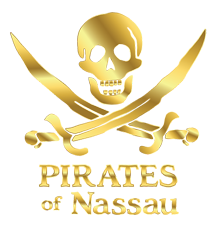 The Golden Age of Piracy lasted for thirty years from 1690 to 1720 and Nassau was at its heart. The era of piracy in the Bahamas began in 1696 when the privateer Henry Every brought his ship the Fancy loaded with loot from plundering Indian Empire trade ships into Nassau harbour. Henry Every bribed the Governor of The Bahamas Nicholas Trott with gold, silver and with the Fancy itself which was still loaded with 50 tons of elephant tusks and 100 barrels of gunpowder. This established Nassau as a base where pirates could operate safely, although various governors regularly made a show of suppressing piracy.
The Golden Age of Piracy lasted for thirty years from 1690 to 1720 and Nassau was at its heart. The era of piracy in the Bahamas began in 1696 when the privateer Henry Every brought his ship the Fancy loaded with loot from plundering Indian Empire trade ships into Nassau harbour. Henry Every bribed the Governor of The Bahamas Nicholas Trott with gold, silver and with the Fancy itself which was still loaded with 50 tons of elephant tusks and 100 barrels of gunpowder. This established Nassau as a base where pirates could operate safely, although various governors regularly made a show of suppressing piracy.

The pirates became increasingly powerful and the era of true pirate control occurred when a combined Franco-Spanish fleet attacked Nassau in 1703 and again in 1706. The island was effectively abandoned by many of its settlers and left without any English government presence. Nassau was then taken over by English privateers who became completely lawless pirates over time. The Bahamas were well-suited as a base of operations for pirates as its waters were too shallow for a large man-of-war but deep enough for the fast, shallow draft vessels favoured by pirates. From their snug harbour in Nassau they could employ their hit and run tactics to full effect and they devastated the merchant shipping that plied the trade routes just a short sail away. The pirates essentially established their own “Republic” with its own “governors” and their plundered booty forming the basis of a thriving community that attracted rogues, merchants and wild women from far and wide. It was said that when pirates slept, they did not dream of going to heaven but instead of returning to their favourite port of Nassau on New Providence Island.
 By 1713 the War of the Spanish Succession was over but many British privateers were slow to get the news or reluctant to accept it and so slipped into piracy. This led to large numbers of unemployed privateers making their way to New Providence to join the “Republic” and swell its numbers. The “Republic” was dominated by two famous pirates who were bitter rivals – Benjamin Hornigold and Henry Jennings. Hornigold was mentor to pirates such as the infamous Edward Teach, known as “Blackbeard”, along with Sam Bellamy and Stede Bonnet. Jennings was mentor to Charles Vane, “Calico” Jack Rackham, Anne Bonny, and Mary Read. Despite their rivalries, the pirates formed themselves into the “Flying Gang” and quickly became infamous for their exploits. The Governor of Bermuda stated that there were over 1,000 pirates in Nassau at that time and that they greatly outnumbered the 100 inhabitants of the city. Blackbeard was later voted by the pirates of Nassau to be their “Magistrate” and to be in command of their “Republic” and enforce law and order as he saw fit.
By 1713 the War of the Spanish Succession was over but many British privateers were slow to get the news or reluctant to accept it and so slipped into piracy. This led to large numbers of unemployed privateers making their way to New Providence to join the “Republic” and swell its numbers. The “Republic” was dominated by two famous pirates who were bitter rivals – Benjamin Hornigold and Henry Jennings. Hornigold was mentor to pirates such as the infamous Edward Teach, known as “Blackbeard”, along with Sam Bellamy and Stede Bonnet. Jennings was mentor to Charles Vane, “Calico” Jack Rackham, Anne Bonny, and Mary Read. Despite their rivalries, the pirates formed themselves into the “Flying Gang” and quickly became infamous for their exploits. The Governor of Bermuda stated that there were over 1,000 pirates in Nassau at that time and that they greatly outnumbered the 100 inhabitants of the city. Blackbeard was later voted by the pirates of Nassau to be their “Magistrate” and to be in command of their “Republic” and enforce law and order as he saw fit.
While the pirates had originally avoided attacking British ships, this restraint disappeared over time and, at their height, the pirates could command a small fleet of ships that could take on the frigates of the Royal Navy. The amount of havoc the pirates were causing led to an outcry for their destruction and finally George I appointed Woodes Rogers as Governor of the Bahamas to bring the Republic of Pirates to an end. In 1718 Rogers arrived in Nassau with a fleet of seven ships and carrying a pardon for all those who turned themselves in and refrained from further piracy. Among those who accepted this offer was Benjamin Hornigold and, in a shrewd move, Rogers commissioned Hornigold to hunt down and capture those pirates who refused to surrender and accept the royal pardon. As a former privateer himself, Hornigold was well placed to understand what needed to be done and he pursued his former comrades with zeal. Although pirates such as Charles Vane and Blackbeard evaded capture, Hornigold did take ten pirates prisoner and nine of them were executed on the morning of 12th December 1718. This act re-established British control and ended the Republic of Pirates in The Bahamas but you can now relive the Golden Age of Piracy at Pirates of Nassau and experience what it was like to be a pirate in 1716.



